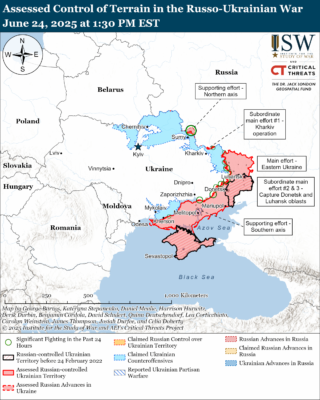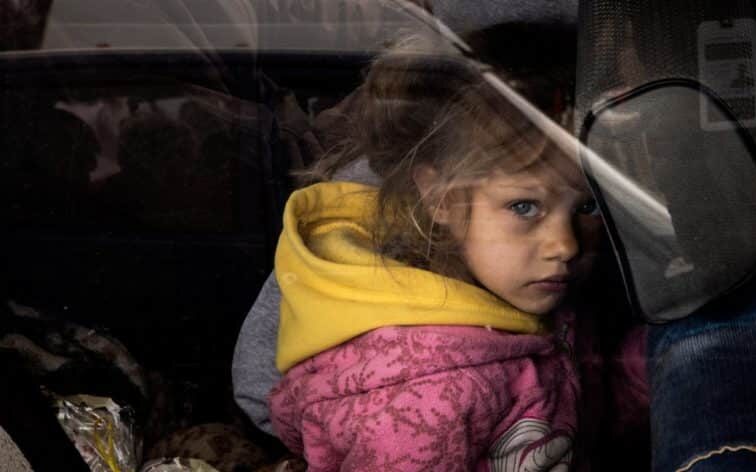Thursday’s Coverage: Zelensky Hails “Long and Substantive” Meeting with Trump

Map: Institute for the Study of War
North Korea may deploy additional troops to Russia as early as July, say South Korean lawmakers briefed by the country’s National Intelligence Service.
The intelligence officials say the potential North Korean deployment could coincide with a large-scale Russian offensive this summer.
The NIS reported that Pyongyang continues to supply Moscow with weapons, including artillery shells and missiles. In return, North Korea is believed to be receiving technical advice for its satellite launches and missile guidance systems.
In June 2025, former Russian Defense Minister and current Secretary of the State Security Council Sergey Shoygu visited North Korea twice. On June 17, he announced North Korea will be sending sappers and construction workers to help rebuild the Kursk region in western Russia, parts of which had been held by Ukraine since last August.
The Trump Administration wants to terminate funding for almost two dozen programs investigating and seeking accountability for war crimes.
The Office of Management and Budget has recommended cancellation, said “two US sources familiar with the matter”. Internal government documents support their claims.
The targeted programs include investigation of Russian war crimes in Ukraine, and atrocities in Myanmar, Syria, Iraq, Nepal, Sri Lanka, and the Gambia.
Among the threatened programs in Ukraine are Global Rights Compliance, which gathers evidence of Russian war crimes, torture, and sexual violence, and Legal Action Worldwide, which supports prosecution of suspects.
The State Department can appeal the OMB’s recommendation, but officials said Secretary of State Marco Rubio is not likely to support most of the programs.
Russia’s short-range drone attacks killed at least 395 people and injuring 2,635 between February 2022 and April 2025, concludes the UN Human Rights Monitoring Mission in Ukraine.
The report documents the deliberate targeting of civilians driving private cars, riding bicycles, walking outdoors, or evacuating others in clearly marked ambulances.
Danielle Bell, the head of the Mission, says:
Although individually less destructive than artillery or missiles, the sheer scale and increasing frequency of short-range drone attacks have made them one of the deadliest weapons in Ukraine.
Over 3,000 civilian casualties — and the relentless frequency of these attacks — have not only caused immense human suffering but also instilled fear, severely disrupted daily life, and crippled access to essential services in several frontline communities.
April 2025 was the deadliest month on record, with 42 civilians killed and 283 injured.
Russia’s Drones Are Hunting and Killing Civilians in Ukraine’s Kherson
At least four civilians have been murdered and 17 injured by a Russian ballistic missile strike on the city of Samar in the Dnipropetrovsk region in south-central Ukraine.
Most of the wounded have been hospitalized. Two men and one woman are in serious condition.
At least two civilians have been killed and 13 injured by Russian drone and missile attacks across Ukraine over the past day.
Air defenses intercepted 365 of 371 incoming Russian munitions including 363 drones, two Kinzhal ballistic missiles, and six Kalibr cruise missiles.
In the Kharkiv region in northeast Ukraine, one person was murdered and four wounded. Houses and an agricultural facility were damaged.
One civilian was slain and three injured in the neighboring Donetsk region. Houses, a farm, administrative buildings, gas pipelines, and vehicles were damaged.
Casualties were also reported in the Kherson, Zaporizhzhia, and the Kyiv regions.
Hungary and Slovakia have blocked the European Union’s 18th package of sanctions over Russia’s full-scale invasion of Ukraine.
The two countries, with leaders sympathetic to the Kremlin and with significant imports of Russian oil and gas, are trying to stop the EU from phasing out Russian energy supplies by 2028.
In March 2023, Hungary and Slovakia were expected from an embargo, allowing them to continue supplies via the Soviet-era Druzhba pipeline.
Slovakia is seeking guarantees that breaking contracts with Russia’s State energy firm Gazprom will not lead to payment of damages.
The EU package includes a reduction of the price cap for Russian oil exports from $60 per barrel to $45.
European Commission President Ursula von der Leyen said early Friday, “We should be in a position to have an agreed package soon.”
In a video message, Ukraine President Volodymyr Zelensky said, “Sanctions against Russia remain one of the most effective tools for limiting its aggression.”
He called for restrictions on energy, banks, finance, Russia’s shadow fleet. and supply chains that bring European components to Russian weapon factories.
Addressing the European Council, I stated: the world is clearly unstable. But the EU plays a key role in preventing Russia’s war from spreading and in moving toward peace. Its sanctions against Russia remain one of the most effective tools for limiting the aggression. pic.twitter.com/OYMLBz99Tc
— Volodymyr Zelenskyy / Володимир Зеленський (@ZelenskyyUa) June 26, 2025
Zelensky also called on EU leaders to advance Ukraine’s candidacy for membership in the bloc:
What’s needed now is a clear political message – that Ukraine is firmly on the European path and that Europe stands by its promises.
This is what gives motivation, support and strength to the men and women who are defending their families against Russia’s criminal and unprovoked war.
Hungary is blocking the opening of accession talks on “cluster one fundamentals”, the values chapters of the EU rulebook on functioning of democratic institutions, an independent judiciary, and sound public administration.
Von der Leyen supported
Under relentless fire, Ukraine is passing reform after reform.
This is why the Commission defends the opening of the first cluster of negotiation.
Ukraine has delivered – now we must too.
Because the accession process is based on merit.
And Ukraine merits moving forward. pic.twitter.com/t58dBHtwP5
— Ursula von der Leyen (@vonderleyen) June 26, 2025
The Humanitarian Research Lab examined Russian databases, official documents, family connections, and satellite images of Russian sites and official buildings.
The Lab’s Director, Nathaniel Raymond, executive director of Yale’s Humanitarian Research Lab, which has been investigating the abductions, says, “This is likely the largest child abduction in war since World War II – comparable to the Germanification of Polish children by the Nazis.”
In March 2023, the International Criminal Court issued arrest warrants for Vladimir Putin and Russia’s “Children’s Rights” Commissioner Maria Lvova-Belova. The Kremlin has defied the charges: during Ukraine-Russia talks in Istanbul last month, a Russian official said Kyiv was “staging a show on the topic of lost children”.
Ukraine been able to arrange the return of only 1,366 juveniles. One of those rescued, a 9-year-old, speaks of indoctrination in her new “home”: “We had to sing the Russian anthem and draw the tricolor” of the Russian flag.
One mother, Natalia, told The Guardian of how she lost her sons. In September 2022, during the occupation of their home city, Kherson in southern Ukraine, a neighbor advised her to send the boys to a children’s camp in Anapa, a seaside resort town in Russia.
The 21-day “free” trip never ended. When Ukrainian troops liberated Kherson in November, Russia refused to refuse the children unless Natalia could get to Anapa.
With the help of a Ukrainian organisation, Natalia obtained a passport and identification documents for her children. She travelled alone across the border, passing through numerous checkpoints. After six days of travel, amid shelling, she was reunited with the boys in February 2023.
“They Will Be Lost”
Other parents and children are not so fortunate. Many of the deport have disappeared into Russia’s “adoption” system. Daria Kasyanova, chair of the Ukrainian Child Rights Network, explains:
Sometimes there are cases when one parent is on Ukrainian territory and the other one is in the occupation with the child. And if that parent dies or is arrested, then the child is left alone and at the risk of getting put into an orphanage. And if that happens, it’s basically impossible to get the child back. They will be lost.
Ksenia, an evacuation specialist at the Ukrainian charity Helping to Leave, says, “We are discussing territories – and our people, our children, are our territories. How can we give them up? These are our children, they are Ukrainian and they have to be brought [home]. Russia doesn’t have any right to them.”
The Humanitarian Research Lab’s Raymond makes clear, “Taking a child from one ethnic or national group and making them part of another ethnic or national group – that’s a war crime.”
